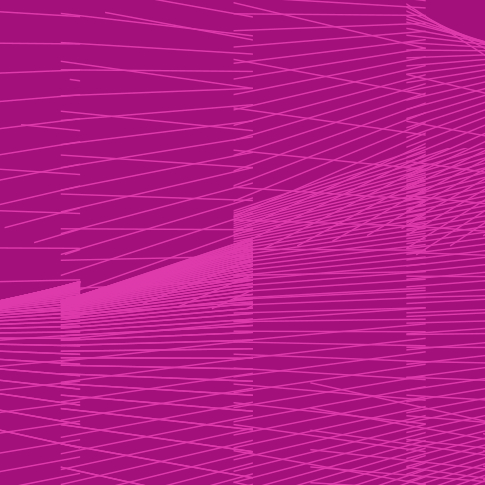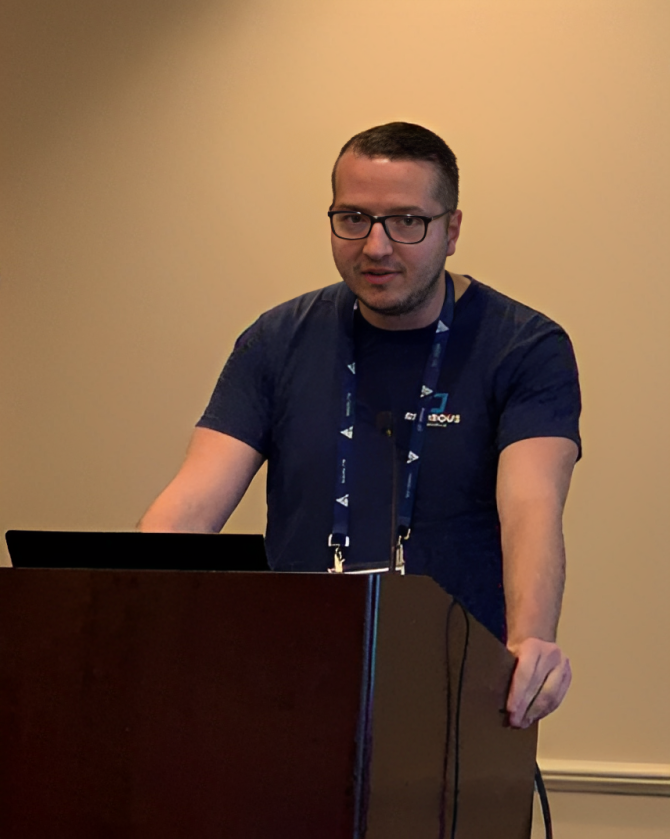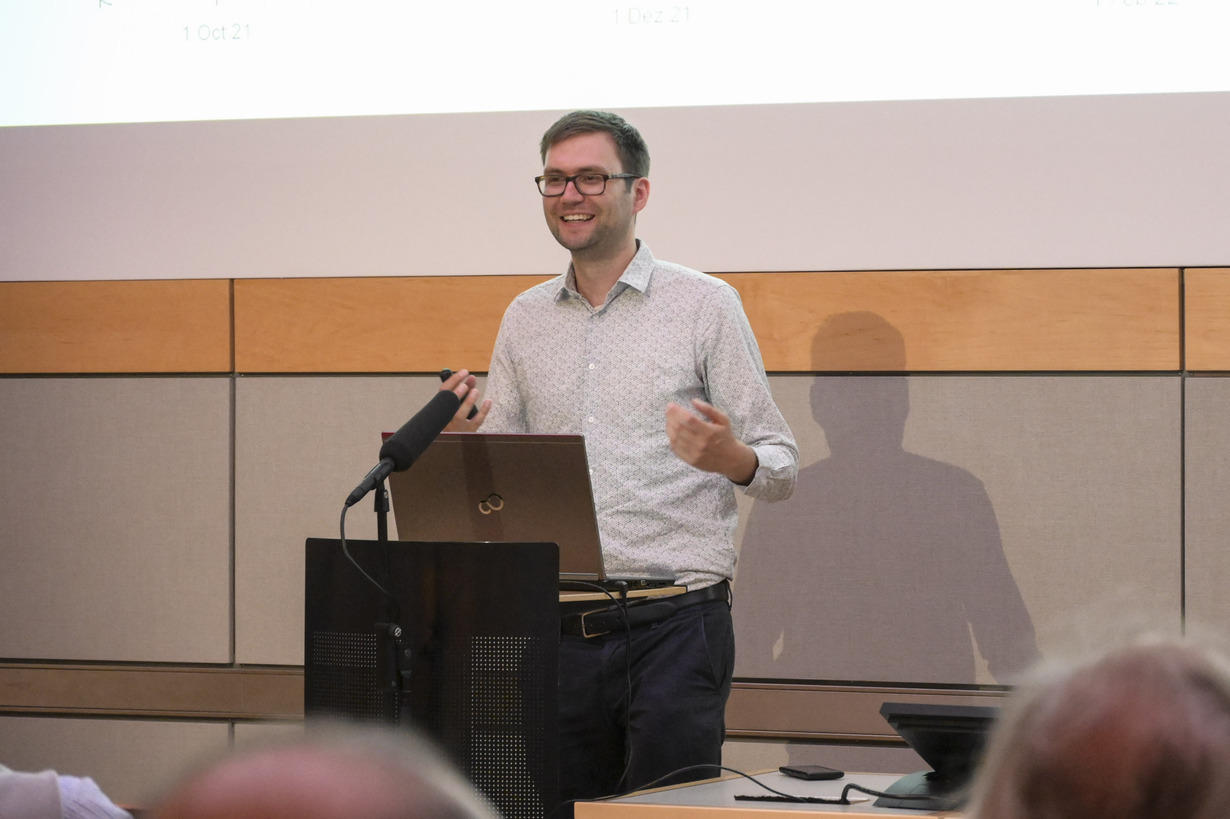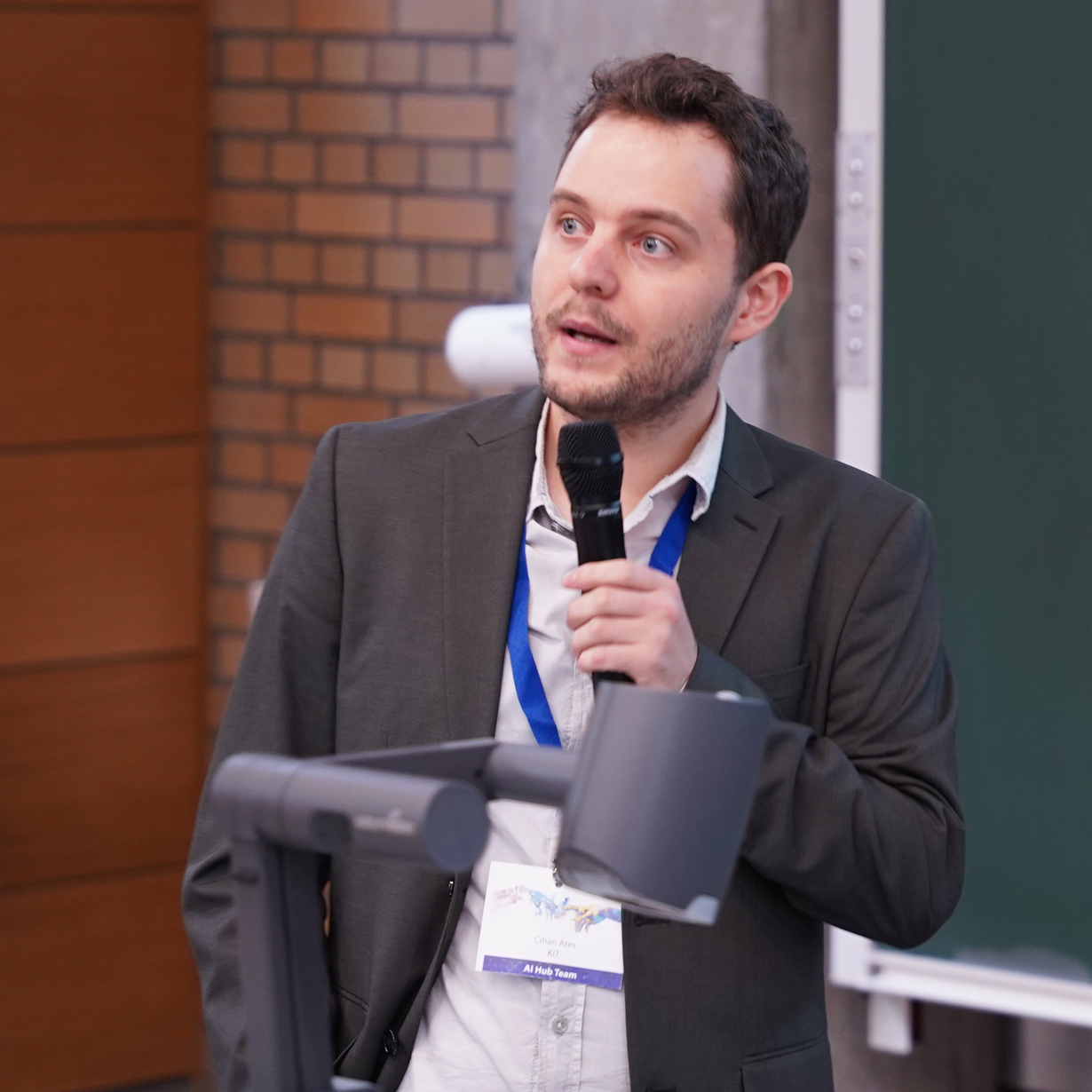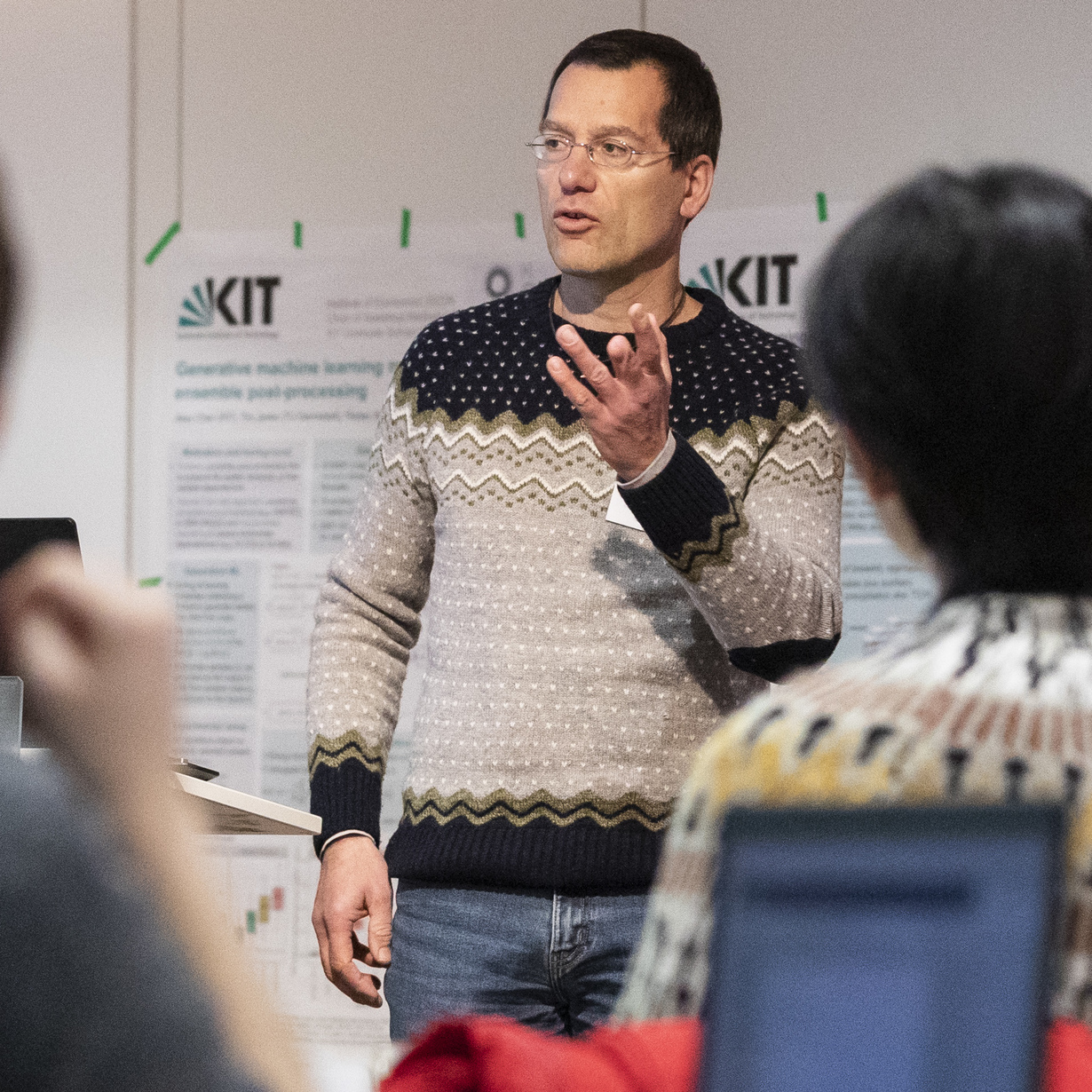Campus South, building 20.30, 3rd floor, room 3.060 ("Wellenraum")
Dr. Carsten Rohr, Soft Skills in Hard Science
This two-day on-site workshop takes place on Januar 13 & 14, 2025.
Content
Publications of research results is the currency in modern science. It might not be your favourite occupation, but it is a decisive one, strongly determining your future research and career opportunities. In this course, you will be introduced to the process of writing a scientific paper. In order to deepen and apply this knowledge, you will also actually produce a manuscript based on your research data (and one that might serve as the foundation for a journal submission). Questions about other forms of text like conference papers can also be discussed.
A-Z of scientific writing
Developing a clear main message
Priority setting in the writing process
Structure and logical flow of the text
Create meaningful graphics
Memorable introduction and abstract
How to develop a daily writing routine
Efficient communication with co-authors
Plus: Writing with AI tools
Please note: Given that this is a hands-on workshop, you need some (analysed) data that can serve as the foundation for a journal article. Please also bring some scientific texts written by you (e.g. Bachelor or Master thesis, as well as any published or upcoming papers) to the workshop.
Registration
Please visit the KCDS intranet portal to register for this course.
For non-members of KCDS:
In order to be able to book the course, a KCDS guest/non-member account is necessary.
If you don't have an account yet, you can register here: Create a KCDS account to book courses
Once your account is activated by a KCDS administrator, you will be able to book the course.
Picture by Joanna Kosinska on Unsplash
Campus South, building 20.30, 3rd floor, room 3.060 ("Wellenraum")
Dr. Carsten Rohr, Soft Skills in Hard Science
This two-day on-site workshop takes place on Januar 13 & 14, 2025.
Content
Publications of research results is the currency in modern science. It might not be your favourite occupation, but it is a decisive one, strongly determining your future research and career opportunities. In this course, you will be introduced to the process of writing a scientific paper. In order to deepen and apply this knowledge, you will also actually produce a manuscript based on your research data (and one that might serve as the foundation for a journal submission). Questions about other forms of text like conference papers can also be discussed.
A-Z of scientific writing
Developing a clear main message
Priority setting in the writing process
Structure and logical flow of the text
Create meaningful graphics
Memorable introduction and abstract
How to develop a daily writing routine
Efficient communication with co-authors
Plus: Writing with AI tools
Please note: Given that this is a hands-on workshop, you need some (analysed) data that can serve as the foundation for a journal article. Please also bring some scientific texts written by you (e.g. Bachelor or Master thesis, as well as any published or upcoming papers) to the workshop.
Registration
Please visit the KCDS intranet portal to register for this course.
For non-members of KCDS:
In order to be able to book the course, a KCDS guest/non-member account is necessary.
If you don't have an account yet, you can register here: Create a KCDS account to book courses
Once your account is activated by a KCDS administrator, you will be able to book the course.
Picture by Joanna Kosinska on Unsplash
Room 2.059; Building 20.30
Selina Drews, TU Darmstadt
For many years, classical learning theory suggested that neural networks with a large num-ber of parameters would overfit their training data and thus generalize poorly to new, unseen data. Contrary to this long-held belief, the empirical success of such networks has been remarkable. However, from a mathematical perspective, the reasons behind their perfor-mance are not fully understood.
In this talk, we consider overparameterized neural networks learned by gradient descent in a statistical setting. We show that an estimator based on an overparameterized neural net-work - trained with a suitable step size and for an appropriate number of gradient descent steps - can be universally consistent. Furthermore, under suitable smoothness assumptions on the regression function, we derive rates of convergence for this estimator.
These results provide new insights into why overparameterized neural networks can
generalize effectively despite their high complexity.
NTI Lecture Hall
KIT, Campus Süd
…
Triangel Studio (building 05.20 at Kronenplatz)
Prof. Victoria Stodden, University of Southern California
In this interactive workshop, Victoria Stodden invites the KIT community, especially early career researchers, to create ideas and proposals for facilitating research that is data-, compute-, or AI-enabled. The goal is to formulate a draft set of recommendations for accelerating research, focusing on shared and open workflows and reproducibility of results. We will workshop a "reproducible pipeline" with either real examples of the work you are currently doing, or prototype examples. We will identify reproducibility barriers you are facing and then 1) validate or repudiate the ideas from the plenary talk and 2) use this as a springboard to formulate a set of recommendations emerging from the workshop.
The workshops will build on ideas that will be introduced during the plenary talk by Victoria Stodden on January 20th, but the events will be stand-alone - if you can't attend the talk, you will still be able to participate in the workshop.
Register until January 14, 2025!
Hybrid: TRIANGEL Studio @Kronenplatz and Zoom
Prof. André Platzer, Dr. Ö. Sahin Tas, Dr. Ramy Zeineldin, KIT
The KIT Graduate School Computational and Data Science (KCDS) at KIT Center MathSEE is delighted to kick off the new year with an exciting KCDS Talk in January.
The topic for January is "Safe AI: Research Frontiers in Academia" As AI continues to play a growing role in critical sectors such as healthcare, autonomous systems, and intelligent production, ensuring safety and reliability in AI systems has become a major focus for researchers.
We are pleased to host a panel of distinguished academic experts who are leading research in safe AI:
Dr. Ramy Zeineldin (FAU Erlangen-Nürnberg - Department of Artificial Intelligence in Biomedical Engineering)
Dr. Ö. Sahin Tas (FZI - Intelligent Systems & Production Engineering)
Prof. André Platzer (KIT KASTEL - Logic of Autonomous Dynamical Systems)
This talk will dive into the research frontiers in AI safety, exploring how academia is advancing methods to ensure that AI technologies are robust, secure, and trustworthy. From biomedical applications to autonomous systems, these experts will share insights from their latest research and discuss the challenges and opportunities in making AI safer.
Following the talk, there will be a discussion with the speakers, offering attendees the opportunity to ask questions and engage in conversation about the topic. The session will be hosted by Lukas Frank.
Snacks and Drinks & Networking Opportunity: After the event, there will be food provided, offering an excellent opportunity to network with the speakers and other attendees. Make the most of this chance to connect and discuss ideas with fellow researchers and professionals.
Whether you’re a student, researcher, or professional working with AI or simply interested in the future of safe AI, this event promises to be both informative and engaging.
Join us in person or via Zoom – the event is free and open to all without prior registration.
online
Dr. Christian Dumpitak , iGRAD – Interdisciplinary Graduate and Research Academy Düsseldorf, HHU Düsseldorf
Online
The event will be held in English and run for two days, on February 17 and 18, 2025.
Researchers are responsible for ensuring that their own conduct complies with the standards of good research practice. The workshop will introduce basic issues of research integrity by addressing important guidelines of the Deutsche Forschungsgemeinschaft (DFG) and specific regulations of KIT for safeguarding good research practice – relevant for every early career researcher@KIT.
A) Basics of Responsible Conduct
Introduction: Research, ethical principles and professional ethos of a researcher
Basic (inter-)national recommendations and regulations for safeguarding good research practice
Research misconduct: Examples, elements of offense, reasons and consequences
B) General Responsibilities
Quality management: research design, documentation/archiving
Publication process, authorship and review of manuscripts
Supervision: Expectations/duties/roles
Organizational culture: Collaboration, communication, prevention and dealing with conflict
Procedures in case of suspicion and relevant contact points
C) Important Specific Responsibilities
Important prior to any data collection: Authorization or permission relevant research
Possible topics (depending on participants’ disciplinary/research background): ‘Research on animals’, ‘Research on humans’ and/or ‘Surveys, interviews, data privacy and security issues in research’
Throughout the various sections of the workshop the use of text- and image-generating AI will be discussed as an integral part.
Via dialogic inputs, discussion of case examples, single/group work and plenary discussion participants will have the opportunity to discuss and reflect their individual research practice and professional attitudes on being a researcher.
This event is open to members of KCDS.
The event will be held in English and run for two days, on February 17 and 18, 2025.
Technical requirements: To participate in this event, you need a stable internet connection, a webcam and a microphone. Participants will receive further detailed information regarding the online-platform prior to the event.
If you are unable to attend an event, please inform us promptly via e-mail. This way you are allowing your colleagues the opportunity to participate and you help us to maintain the quality of our qualification program. Thank you!
This workshop is being organized in cooperation with CRC Wave Phenomena.
To register for this workshop, please inquire via e-mail: kcds@kit.edu
online
Dr. Christian Dumpitak , iGRAD – Interdisciplinary Graduate and Research Academy Düsseldorf, HHU Düsseldorf
Online
The event will be held in English and run for two days, on February 17 and 18, 2025.
Researchers are responsible for ensuring that their own conduct complies with the standards of good research practice. The workshop will introduce basic issues of research integrity by addressing important guidelines of the Deutsche Forschungsgemeinschaft (DFG) and specific regulations of KIT for safeguarding good research practice – relevant for every early career researcher@KIT.
A) Basics of Responsible Conduct
Introduction: Research, ethical principles and professional ethos of a researcher
Basic (inter-)national recommendations and regulations for safeguarding good research practice
Research misconduct: Examples, elements of offense, reasons and consequences
B) General Responsibilities
Quality management: research design, documentation/archiving
Publication process, authorship and review of manuscripts
Supervision: Expectations/duties/roles
Organizational culture: Collaboration, communication, prevention and dealing with conflict
Procedures in case of suspicion and relevant contact points
C) Important Specific Responsibilities
Important prior to any data collection: Authorization or permission relevant research
Possible topics (depending on participants’ disciplinary/research background): ‘Research on animals’, ‘Research on humans’ and/or ‘Surveys, interviews, data privacy and security issues in research’
Throughout the various sections of the workshop the use of text- and image-generating AI will be discussed as an integral part.
Via dialogic inputs, discussion of case examples, single/group work and plenary discussion participants will have the opportunity to discuss and reflect their individual research practice and professional attitudes on being a researcher.
This event is open to members of KCDS.
The event will be held in English and run for two days, on February 17 and 18, 2025.
Technical requirements: To participate in this event, you need a stable internet connection, a webcam and a microphone. Participants will receive further detailed information regarding the online-platform prior to the event.
If you are unable to attend an event, please inform us promptly via e-mail. This way you are allowing your colleagues the opportunity to participate and you help us to maintain the quality of our qualification program. Thank you!
This workshop is being organized in cooperation with CRC Wave Phenomena.
To register for this workshop, please inquire via e-mail: kcds@kit.edu
Hybrid: TRIANGEL Studio @Kronenplatz and Zoom
Louise Kluge, Lisa Leimenstoll, Gabriel Mejia Ruiz, Lilly Osburg, KIT
The KIT Graduate School Computational and Data Science (KCDS) at KIT Center MathSEE is excited to present a special edition of the KCDS Talks in February, where KCDS Fellows will showcase their cutting-edge research. This event offers a glimpse into the innovative work being done by the next generation of computational and data scientists.
Join us to hear from four talented fellows as they present their fascinating research topics:
Gabriel Mejia Ruiz (KIT SCC)
"Trainability of Data-Driven Quantum Models"
Gabriel will explore the challenges and possibilities of training quantum models using data-driven approaches and discuss their implications for of quantum computing.
Louise Kluge (KIT SCC)
"Efficient Bayesian Inference in Cosmological Simulations: A Challenge in Uncertainty Quantification"
Louise will delve into how Bayesian inference can be applied to large-scale cosmological simulations, particularly focusing on methods to address uncertainty quantification.
Lisa Leimenstoll (KIT STAT)
"Causality in Extremes: Exploring the General Case of Different Tails"
Lisa will present her research on extreme value theory, particularly focusing on estimating causal relationships in extreme events.
Lilly Osburg (KIT SCC)
"Exploitation of Humanities Data for Big Data Analysis"
Lilly will explore how data from the humanities can be exploited for large-scale analysis using big data techniques, shedding light on interdisciplinary research opportunities.
Following the talk, there will be a discussion with the speakers, offering attendees the opportunity to ask questions and engage in conversation about the topic. The session will be hosted by Lilly Osburg and Lukas Frank.
Snacks and Drinks & Networking Opportunity: After the event, there will be food provided, offering an excellent opportunity to network with the speakers and other attendees. Make the most of this chance to connect and discuss ideas with fellow researchers and professionals.
Whether you're a student, researcher, or simply curious about the latest trends in computational science, this event will provide valuable insights into diverse and impactful research areas.
Join us in person or via Zoom – the event is free and open to all without prior registration.
t.b.a.
Hanna Woye
“PhD in physics? You don’t seem like a nerd at all.”
“You’re a woman in biology? Guess that helped with getting research funding, huh?
“Mathematics degree? For teaching, right?”
“Environmental science? I guess you’re one of those climate activists then.”
We’re all familiar with it: being pigeonholed. Sometimes it’s through casual, subtle remarks, other times it’s direct and hurtful, and sometimes it remains unspoken.
We also pigeonhole others ourselves when we interact with them. Since these labels influence our perception and actions, they aren’t just unconscious biases but have real consequences.
Understanding the mechanisms behind these biases and their potential effects helps us, on one hand, to scrutinize our own biases and avoid acting upon them, and on the other hand, to devise strategies for dealing with situations in which we are unfairly pigeonholed.
In this interactive workshop, participants delve deeper into the topic of unconscious bias. The focus lies on hands-on methods that bridge cognitive knowledge about unconscious assumptions with emotional aspects. Furthermore, participants work on strategies to deal with unconscious assumptions with which they themselves are labeled.
Thematic Focal Points
Perception:
Exploring how we view the world and how stereotypes form.
Personal Perspective:
Understanding my background and its impact on my perception of women.
Stereotypes and Prejudices:
Examining the functions of prejudices and strategies for managing them.
Discrimination and Power Imbalances:
Exploring the connection between unconscious biases and structural inequality.
Managing Biases:
Developing personal strategies for adressing gender stereotypes and other biases. ODER Developing personal strategies for dealing with biases.
